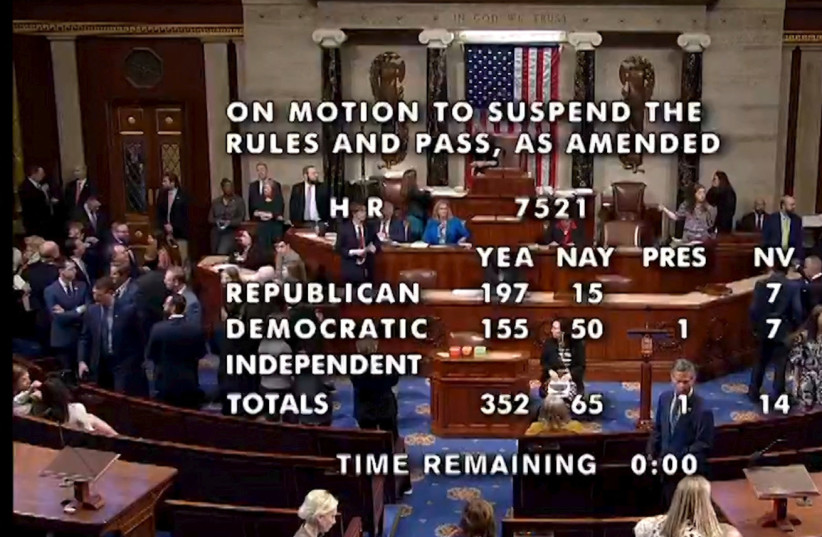Jewish Federations of North America praised the US House of Representatives for overwhelmingly passing a bill on Wednesday that would give TikTok's Chinese owner ByteDance about six months to divest the US assets of the short-video app, or face a ban.
According to a statement from JFNA, research shows a spike in antisemitism on TikTok more than any other social network.
TikTok has helped fuel a horrific spike in antisemitism, JFNA President and CEO Eric Fingerhut said in the statement, and Wednesday's vote showed bipartisan support ensuring TikTok cannot push hateful messages.
The bill passed 352-65, with bipartisan support, but it faces a more uncertain path in the Senate where some favor a different approach to regulating foreign-owned apps posing security concerns. Senate Majority Leader Chuck Schumer said the Senate will review the legislation.
TikTok users who use the app for over 20 minutes a day are 17% more likely to hold antisemitic or anti-Israel views, compared to 6% on Instagram and 2% on X/Twitter, JFNA said.

Federations: TikTok is beholden to the Chinese government
"TikTok’s parent company is beholden to the Chinese government, which has squarely positioned itself against Israel since October 7th. China has filled its state-controlled media and social media channels with antisemitic and anti-Israel rhetoric," JFNA's statement said. "The bill is NOT a ban on TikTok, nor does it restrict a user’s First Amendment rights. But the harm TikTok is doing cannot be ignored. "
JFNA said it urges the Senate to pass the bill and send it to President Biden, who indicated he will sign it.
"A society that can’t control the virus of antisemitism from spreading through a social media platform will soon find itself facing existential threats to the very fabric of civic life," JFNA said.
The fate of TikTok, used by about 170 million Americans, has become a major issue in Washington. Lawmakers said their offices had received large volumes of calls from teen-age TikTok users who oppose the legislation, with the volume of complaints at times exceeding the number of calls seeking a ceasefire between Israel and Hamas in Gaza.
"This process was secret and the bill was jammed through for one reason: it's a ban," a TikTok spokesperson said after the vote, adding that they hoped the Senate will "consider the facts, listen to their constituents," when considering the bill.
The measure is the latest in a series of moves in Washington to respond to US national security concerns about China, from connected vehicles to advanced artificial intelligence chips to cranes at US ports.
"This is a critical national security issue. The Senate must take this up and pass it," No. 2 House Republican Steve Scalise said on social media platform X.
Senate Commerce Committee chair Maria Cantwell, who will play an important role in the Senate's next move, said she wants legislation "that could hold up in court," and is considering a separate bill, but is not sure what her next step is.
The vote comes just over a week since the bill was proposed following one public hearing with little debate, and after action in Congress had stalled for more than a year. Last month, President Joe Biden's re-election campaign joined TikTok, raising hopes among TikTok officials that legislation was unlikely this year.
The House Energy and Commerce Committee last week voted 50-0 in favor of the bill, setting it up for a vote before the full House.
TikTok users rally outside Capitol building
Several dozen TikTok users rallied outside the Capitol before the vote. The company paid for their travel to Washington and accommodations, a TikTok spokesperson said.
The group included Mona Swain, 23, who said she had joined TikTok in 2019, during her freshman year at college pursuing musical theater. Now a full-time content creator, she said she was paying her mother’s mortgage and for her brother and sister’s college educations with her earnings from the app.
"It's gonna put a lot of people out of work, which is the scariest part," Swain said. "We live in a time where the majority of people my age are barely getting by day-to-day. And to be put out of work at such a crazy time in my life and just in a lot of other creators' lives, it’s really, really scary right now."
But the political climate is in favor of the bill. Biden said last week he would sign it and White House national security adviser Jake Sullivan on Tuesday said the goal was ending Chinese ownership, not banning TikTok.
"Do we want TikTok, as a platform, to be owned by an American company or owned by China? Do we want the data from TikTok - children's data, adults’ data - to be going, to be staying here in America or going to China?" he said.
It is unclear whether China would approve any sale or if TikTok's US assets could be divested in six months.
If ByteDance failed to do so, app stores operated by Apple (AAPL.O), opens new tab, Alphabet's (GOOGL.O), opens new tab Google and others could not legally offer TikTok or provide web hosting services to ByteDance-controlled applications.
In 2020, then-President Donald Trump sought to ban TikTok and Chinese-owned WeChat but was blocked by the courts. In recent days he had raised concerns about a ban. It remains unclear if Tencent's (0700.HK), opens new tab WeChat or other high-profile Chinese-owned apps could face a ban under the legislation.
Any forced TikTok divestment from the US would almost certainly face legal challenges, which the company would need to file within 165 days of the bill being signed by the president.
There are still potential legal issues with the American Civil Liberties Union and other advocacy groups arguing the bill is unconstitutional on free speech and other grounds.
In November, a US judge blocked a Montana state ban on TikTok use after the company sued.
